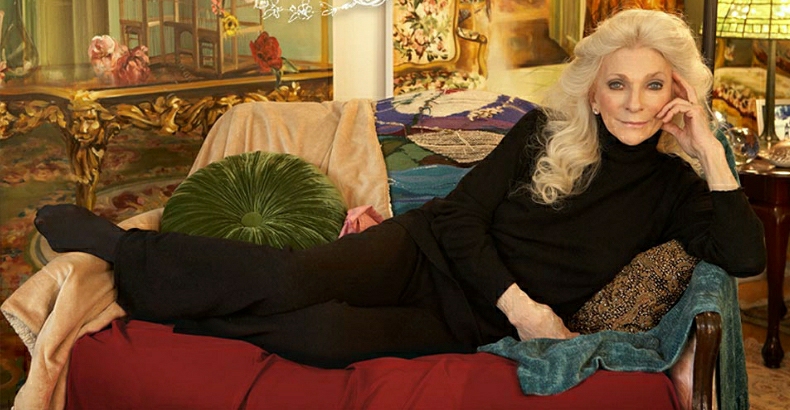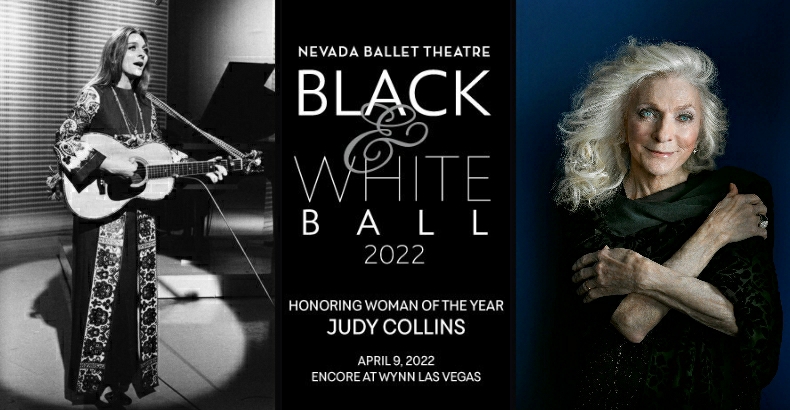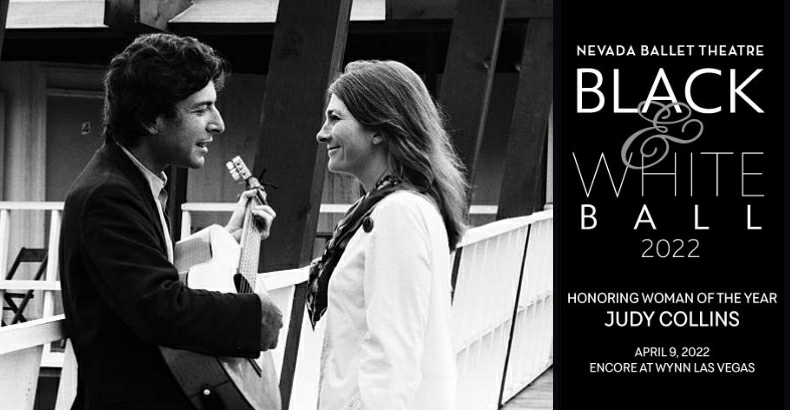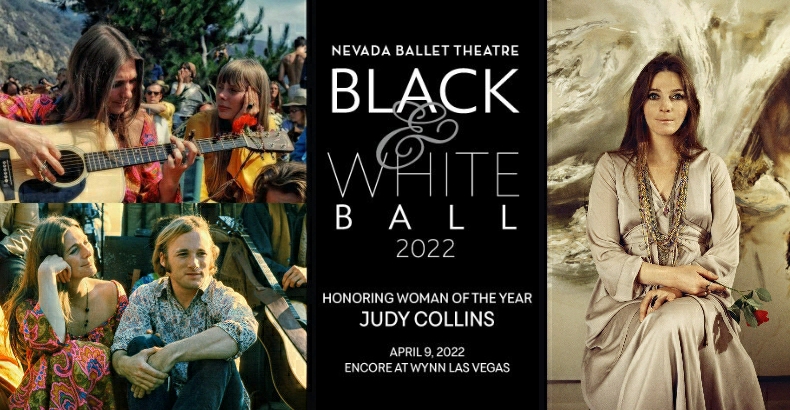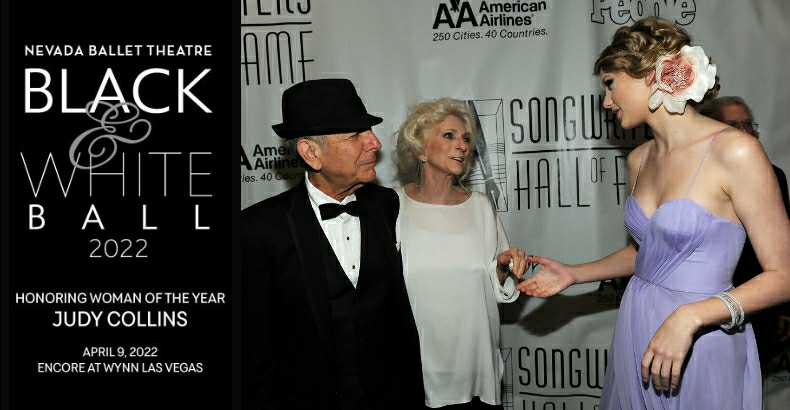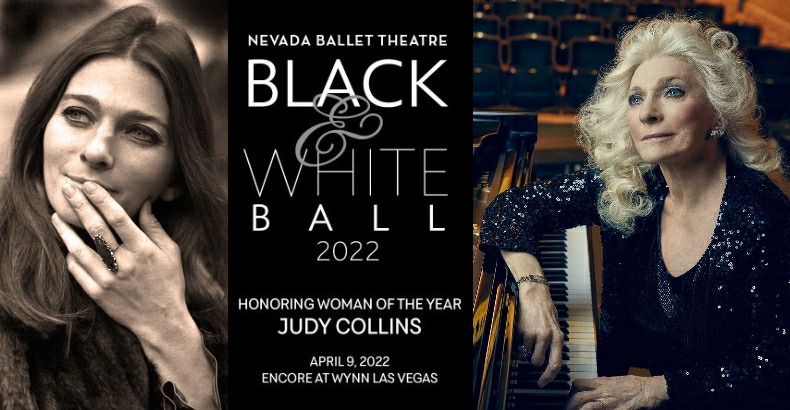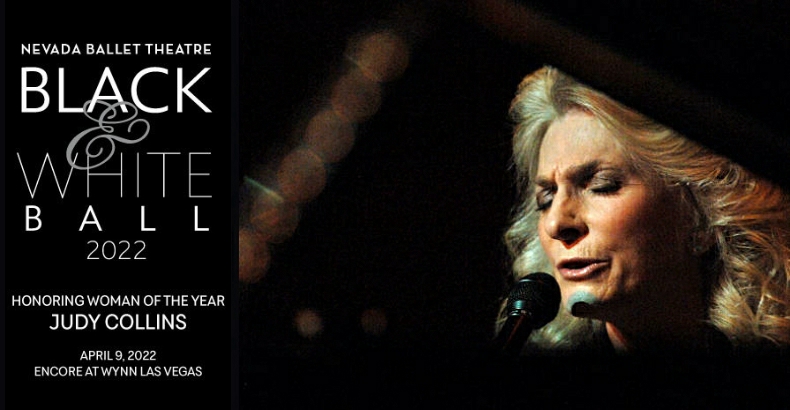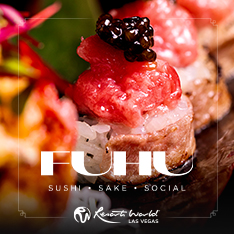Judy Collins—the Grammy Award-winning singer, songwriter, musician, actress, activist, and Academy Award-nominated director and producer (!)—will be honored as “2022 Woman of the Year” at Nevada Ballet Theatre’s 38th annual Black & White Ball, on Saturday, April 09, at Encore at Wynn Las Vegas. Chaired by Todd-Avery Lenahan & John Gorsuch and Dawn & Christopher Hume, it is destined to be a night to remember! Collins, a living American treasure blessed with perfect pitch and a remarkably clarion soprano voice, established her bona fides during the late Sixties, singing beautifully arranged covers of songs by then-emerging songwriters—think Joni Mitchell, Randy Newman, and the late, great Leonard Cohen—in her crystal-clear voice.
[For more background on Collins’ remarkable career of more than 60 years, take a gander at my article, NBT to Honor Judy Collins as 2022 Woman of the Year, from last December.]
I was fortunate to spend an unexpectedly laughter-filled half-hour, recently, speaking with Collins, telephonically; so, here then, is Part 3 of our interview.
CONTINUED FROM PART 2...
I’d like to return to Joni Mitchell and “Both Sides Now” for a moment. Sometime, before COVID, I read an article about you—I'm pretty sure it was in The New York Times—and there was this great quote. "She sang ‘Both Sides Now’ by Joni Mitchell, and she made Joni Mitchell famous. She sang ‘Suzanne’ by Leonard Cohen and made Leonard Cohen famous." And that’s definitely a truism. And there certainly is a parallel to be drawn, but from what I've read, your relationships with Mitchell and with Cohen could not have been more different.
Oh, that's true. Well, Leonard was my heartthrob as a performer because I fell in love with his songs. But he remained a close friend of mine until his death. And I just felt that there was something about— thank goodness I didn't have an affair with him! Thank God! I mean, I know that those who did have— Well, they haven't turned out too well for the ones on the other end, including Joni. But, of course, she got a lot of material out of that year, I think, that she spent seeing him. But he was remarkable and unusual. And well, of course, I live in New York and Joni's on the West Coast, so we seldom see each other. I think we may have seen each other about five times. There was a time after I recorded “Both Sides Now,” when we were both in LA, and we hung out with the CSN-bunch after Stephen [Stills] had written a song about me. *
“Suite: Judy Blue Eyes” – Of course!
And so, I think that— I don't know. I think artists have a hard time letting go of what they've written. Yoko Ono said to me one time, "A song has its own destiny. It doesn't have a lot to do with who wrote it or who is singing it. It has a destiny, to go where it's supposed to go." And I think that's what happens. Otherwise, everybody would be singing the same thing all the time, which is nuts.
Oh, wow: I never thought about it, that way. Who are your favorite songwriters?
Oh. Without a doubt, Leonard Cohen, Jimmy Webb, Joni Mitchell, a guy named Dave Carter—whom I've only discovered recently—Stephen Sondheim, for sure, and John Newton. Not bad, “Amazing Grace”.
Yeah. That one seems to have hung around for a while. {Both chuckle} Earlier, I asked you what your greatest joy was as an artist. Do you have a great regret as an artist?
A regret?
A path not taken, a song not recorded, an avenue not explored.
Not really.
I mean, you seem to have dabbled into so many different mediums.
Yes, I have.
In 1974 you directed and co-produced a documentary, for which you were nominated for an Academy Award, and it was about Antonia Brico, the conductor who had taught you piano, correct?
Yes. Yes. She was the first woman to conduct major symphonies in the world.
In Berlin, as I recall.
First, she started in Berlin. The Berlin Philharmonic. Then she came here. She was the first woman to conduct the New York Philharmonic. She had her own orchestra at Carnegie Hall during the war. And after the documentary came out, she was back with the big orchestras. She was back in New York with the Mostly Mozart Festival, and in London with the London Symphony Orchestra, and conducted it. I don't know where exactly. Albert Hall, I think—anyway, she conducted orchestras all over the world.
Did she really come up to you, after one of your concerts, and say, "You really could have been something," or something like that?
Yes! She said, "You really could have gone places,” because I was her protege. I played Mozart with her symphony in Denver when I was 13. And when I discovered “The Gypsy Rover,” I was practicing the second piano concerto of Rachmaninoff, getting ready to play with her orchestra. So, she was not very happy that I chose a different path.
But then you learned, later on, that she had played ragtime?
Oh yeah. Oh yeah. And it's in the movie. It's hysterical because we worked with her. I and my co-director, and our cameraman, Coulter Watt, had worked with her for a week and had been with her symphony and with the young woman who was sort of playing me. She's a wonderful pianist. And everything was serious. All the interviews were serious. It was all about Beethoven, Bach, Rachmaninoff, Sibelius, and so forth and so on. And then over hamburgers—which was really hysterical—ordered in her house, she sat down at the piano and began to play jazz. And we just screamed with laughter!
Well, she made her living partly in San Francisco, working at the local music store in San Francisco, sitting in the window playing the sheet music that was selling. That's how they used to sell music in the '10s and the '20s. And so, she would sit down, and then the owner of the store would say, "People tell me that when they get the sheet music home, it doesn't sound like what they heard in the window when you were playing it." She was a hot number. She was a great pianist. She had her doctorate in piano before she went to Germany and after everybody told her she couldn't ever become a conductor.
She was Dutch, wasn't she?
She was Dutch and Italian.
How cool. But following that, you never directed again?
No, I had too much to do. I had to keep this career going, and it meant that I had to focus, focus, focus, and that's what I've done. And it's finally brought me to writing my own album of songs, which is just extraordinarily exciting.
And it took you half a century to actually put out that album.
Yes, it did. All along, I was writing songs. And all along, I would have songs in my albums. I wrote “Since You've Asked” at first, and then “Albatross” and the song about my father, “Secret Gardens”, the song about my mother, “In the Twilight”. All of my albums since 1966—except when I did a Sondheim album, or a Dylan or a Lennon-McCartney or a Leonard Cohen album—I would always include my latest song. So, I do have that history of writing all the way through.
Will there be a Spellbound: Part Two (or Volume Two)?
Oh yes. Oh yes. I don't know when it'll be, but it will be coming.
Personally, I think that—and this is a weird thing to say, so forgive me if it comes out oddly—but I think your voice has taken on a more full-bodied sound, with age.
Thank you. Yes. Well, I've studied for many years with a wonderful teacher who taught me how to do what I do today. And so that's my secret weapon because I learned how to do what I do.
Coming at it with the science?
A master. That's right. That's right.
Well, I look forward to meeting you on Saturday night, in person. And thank you so much for your time. You've been a wonderful subject, and I can't wait to get this transcribed and up online.
Oh, fantastic. And thank you so much
Thank you so much! Safe travels and have a wonderful afternoon.
Thanks, dear. You have a good day, and I'll see you then.
You got it, Judy Collins.
Thank you, dear.
Judy Collins honored as 2022 Woman of the Year
Nevada Ballet Theatre | 38th Annual Black & White Ball
April 09, 2022 | Encore at Wynn Las Vegas
Click HERE for info and tickets
Get into it!
#NBT
[Editor’s Notes: * Written by Stephen Stills, “Suite: Judy Blue Eyes” was the second single (following “Marrakesh Express”) released on Crosby, Stills & Nash’s eponymous debut album, Crosby, Stills & Nash (1969). The song was penned by Stills as a response to the sadness he felt following his breakup with Collins, whom he had been dating since 1967. The two remain great friends, to this day, and have toured together, as recently as 2018—even performing at The Smith Center for the Performing Arts on October 21, 2017, as a stop on their Stills & Collins 2017 Tour—while “Suite: Judy Blue Eyes” has been included on VH1’s “Greatest Songs Ever,” in 2000 (#51), Rolling Stone’s “500 Greatest Songs of All Time,” in 2004 (#418), and the Rock & Roll Hall of Fame’s “500 Songs That Shaped Rock & Roll,” in 2017.]

